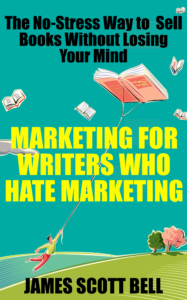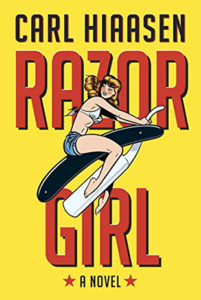From Larry Brooks… introducing you to an article by James N. Frey.
Chances are you’ve heard of James N. Frey. He wrote one of the iconic writing craft books of all time, How to Write a Damn Good Novel (1987), which after three decades remains a consistent seller and presence on the craft shelf of most bookstores and collectors of writing wisdom.
He’s been very generous with me, relative to my own work, blurbing not only my own writing books, but also my fiction. But that’s not the sum total of why I like and respect the guy (which are separate criteria). He tells it like it is – something I’ve tried to emulate – which in the polite company of the collective writing conversation is both a rare and refreshing clarifier among a plethora of vague and often contradictory and downright confusing advice (“Story Trumps Structure,” anyone?).
So today I’m rerunning an article he contributed to my site, Storyfix.com, some eight years ago, a piece that still comes up at conferences as something writers remember, and credit as a milestone in their own writing journey. I’m the first to line up with that response, because it’s one of the boldest, most cringingly accurate musing on the writing life I’ve ever read.
Who You Are, and Who you Ain’t
By James N. Frey
Did you notice, when you told your mother or father, sister, brother, or friend that you wanted to be a writer, the shocked, hurt, bewildered expression on their faces? Spouses, upon hearing the news, often get ill or take to the bottle. Some start packing.
There are a lot of great quotes from famous writers on writing that tell of the struggle writers go through. Supposedly Hemingway said that to be a writer all you have to do is “go into your room, sit in front of your typewriter…and stare at a blank page until blood comes out of your forehead.”
We all know what it feels like to have blood trickling down our forehead. We all know there are days when the words will not flow from our brain to our fingertips, days when the most used key on the keyboard is the delete key, days when you think your mother was right — you should have taken the Post Office exam. We all know days when we say, what the hell am I doing bleeding from my forehead when I could be…playing golf…or fishing…or playing frisbee with my dog.
Of course writers don’t play golf or go fishing or play frisbee with the dog. Few writers even have dogs. Who the hell has time for dogs? Writers don’t go out to a lot of movies, or baseball games, or picnics in the park. Writers don’t do much of anything but write, think about writing, or talk about writing. We go into our little rooms, turn on our music, and turn on our machines and stare at the screen until blood comes out of our foreheads. That’s the writing life. Not all that glamorous or glorious, is it? Taken a day at a time.
And then after countless hours of agony writing, rewriting, workshopping, editing, getting critiques, reading books on craft — some of which are damn good — we try to get published and we find that bleeding from the forehead wasn’t all that bad. Now we’re getting banged on the forehead with rejection slips that hurt more than getting hit with a sledgehammer.
Anybody ever tell you your work was not right for their list? What the hell that does that mean? They have too many critically acclaimed bestsellers on their list?
How about they tell you it’s beautifully written…they loved your characters…you obviously have a lot of talent and a great future, but, gee, it’s just not right for our list…we’re not taking on any new clients at this time. Then why the hell did they say yes to your query letter?
We try to find out what’s wrong, so we go back to book doctors and writers’ workshops and hear that our work is boring or not right for the market, old-fashioned or too avant-garde, doesn’t fit the genre, or is too derivative, and we go back to our room and bleed some rewrite out of our foreheads.
These book doctors charge like hell — there go the kid’s braces — and so we try agents who charge reading fees to finance their trips to the French Riviera.
And then the big day comes and you finally get an agent who seems to really like your stuff. And after it makes the rounds to a couple dozen houses, you hear that the editor loved it, but the pub board said it wasn’t right for their list, that you write beautifully, they loved your characters, but your book, well, is not quite right for their list….
At least, your writer friends tell you, you aren’t still getting printed rejection slips made out to “Dear Author.”
You have by now disabused yourself of the notion that there is an editor waiting in a book-lined office to shepherd your book through the process of getting you critical acclaim and your rightful place on the New York Times bestseller list.
It may happen some day, but in the meantime you’ve found out the first big truth of the writing game — the publishing industry treats writers like shit on their shoes.
The price you pay for being a writer is high.
Read the remainder/entirety of Frey’s article HERE (the entire piece weighs in at well over 3,000 words, too long for this venue. You’ve just read the first 800 of them… the rest are well worth the time, in my opinion.)
Visit James’ website HERE.








